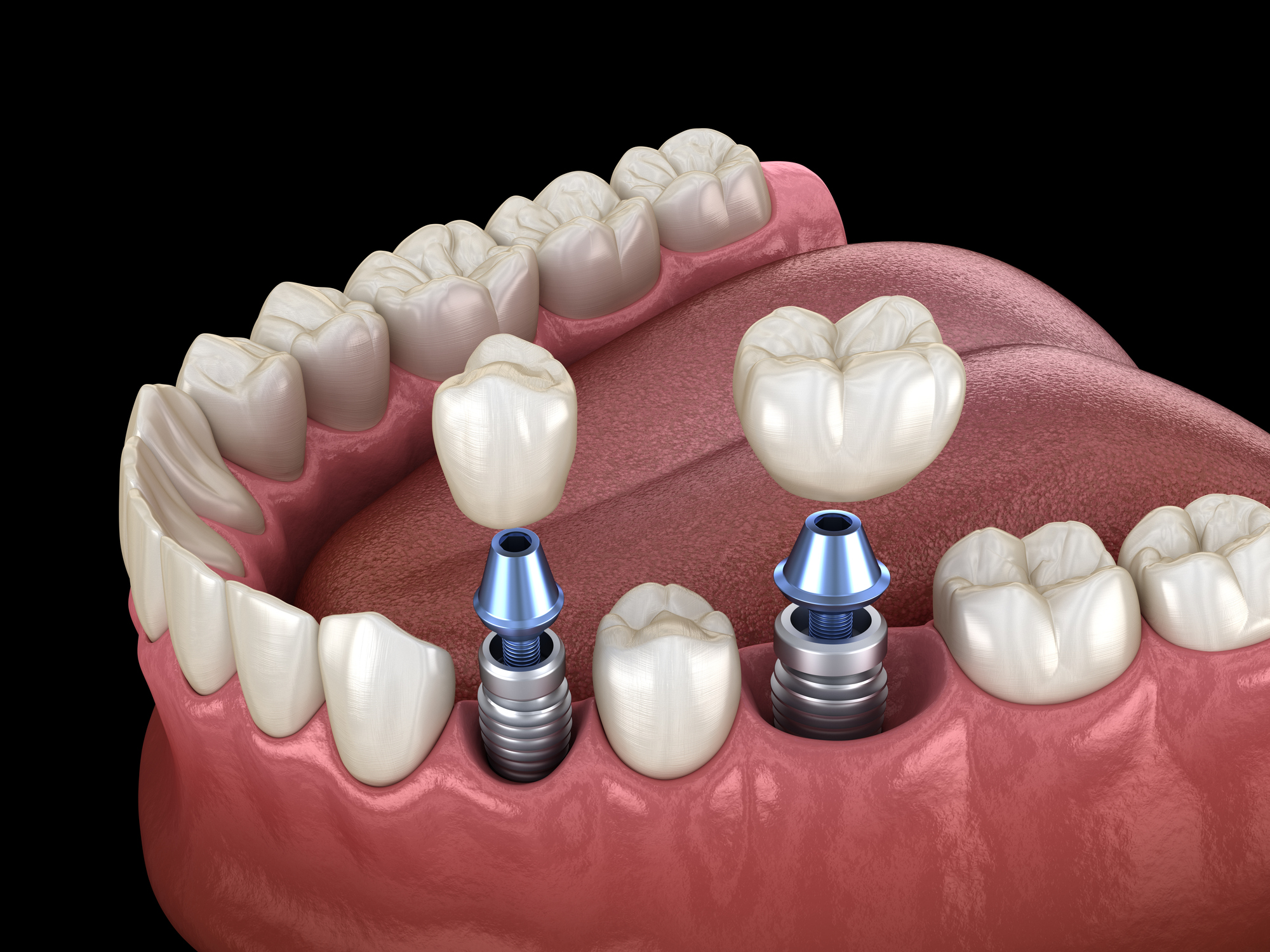Dental Sense Things To Know Before You Get This
Dental Sense Things To Know Before You Get This
Blog Article
An Unbiased View of Dental Sense
Table of ContentsWhat Does Dental Sense Mean?All about Dental SenseGet This Report on Dental SenseExcitement About Dental Sense
are medical gadgets surgically dental implanted into the jaw to restore an individual's capacity to eat or their appearance. They supply assistance for artificial (fake) teeth, such as crowns, bridges, or dentures. When a tooth is lost due to injury or disease, a person can experience complications such as quick bone loss, malfunctioning speech, or adjustments to eating patterns that lead to discomfort.Oral dental implant systems include a dental implant body and oral implant joint and may also consist of a joint fixation screw. Dental implant vs bridge. The dental implant body is surgically put in the jawbone in area of the tooth's root. The oral implant abutment is usually affixed to the implant body by the joint fixation screw and prolongs through gum tissues into the mouth to support the affixed man-made teeth
(https://dentalsense1.weebly.com/)Framework of The Oral Implant System choosing oral implants, talk to your oral provider about the potential advantages and threats, and whether you are a prospect for the procedure. Things to consider: Your overall health is an important consider determining whether you are an excellent prospect for oral implants, for how long it will take to recover, and exactly how long the implant might remain in location.
Cigarette smoking may affect the healing process and reduce the long-term success of the dental implant. The recovery process for the implant body might take several months or longer, throughout which time you normally have a momentary abutment in area of the tooth. the dental implant procedure: Carefully adhere to the oral hygiene directions provided to you by your oral copyright.
10 Simple Techniques For Dental Sense
Implant failing can lead to the need for an additional surgical treatment to fix or change the dental implant system. Restores the capacity to chew Brings back aesthetic appearance Aids keep the jawbone from diminishing as a result of bone loss Preserves the health and wellness of the bordering bone and gums Assists maintain surrounding (nearby) teeth steady Boosts high quality of life Damages to bordering natural teeth during dental implant positioning Injury to the surrounding tissues during surgical treatment, such as sinus opening Injury throughout surgical procedure (for instance, fracture of bordering jawbone) Insufficient function, such as seeming like the teeth do not bite with each other typically A feeling that the tooth hangs or turning in area resulting from an abutment screw loosening Implant body failure (looseness of the implant body) as a result of systemic infection, which might be most likely in clients with unrestrained diabetes mellitus due to regional infection in bone and gum tissues sustaining the dental implant body as a result of postponed recovery, which might be most likely in patients who smoke Difficulty cleaning the periodontals around the dental implant, causing inadequate oral health Neglected gum disease Post-surgical pins and needles as a result of nerve impingement or damages Constantly notify healthcare providers and imaging technicians that you have dental implants before any type of magnetic resonance imaging (MRI) or x-ray procedures.
FDA is not knowledgeable about any kind of unfavorable events reported for MRI or x-ray procedures with oral implants. Oral implants systems are commonly made from products that adhere to international consensus requirements of the International Organization for Standardization (ISO) or ASTM International. These standards have details of what makes a safe product.

An oral implant is a framework that changes a missing tooth. With screw-like devices, the specialist inserts an implant into the jawbone, and it acts as an anchor for a man-made tooth, called a crown.
Dental Sense - Truths
Some people are not qualified for oral implant surgical procedure. It is for oral surgeons to operate individuals with: intense illnessuncontrollable metabolic diseasebone or soft cells condition or infectionIf these concerns are resolved, a person can have the surgical procedure. In, oral doctors avoid from operating people with: If people with any of the above undertake oral implant surgical procedure, there is a greater threat of the implant failing.

Dental implant surgical treatment is a customized procedure. It's not the very same for everyone. However the adhering to gives a general overview of what you can expect your dentist, oral cosmetic surgeon, periodontist or prosthodontist to do: Place the dental implant surgically. Provide you time to recover. Attach the message and last crown, bridge or denture.
Next off, your cosmetic surgeon will thoroughly put the dental implant into your jaw. If your dental implant is near the front of your mouth, your dental expert will make a short-term tooth for you to wear till you recover.
The Main Principles Of Dental Sense
During the recovery stage, your jawbone ought to fuse to the oral implant. This process can take anywhere from 3 to 9 months.
Once your dental implant heals, your dental Full Article professional can affix the joint (tiny connector message) and your last repair (crown, bridge or denture). This typically takes about one hour to finish and might require a second small surgical treatment. You should not feel any type of discomfort during your dental implant treatment due to the fact that your company will certainly use medicine to numb your gum tissues.
Report this page